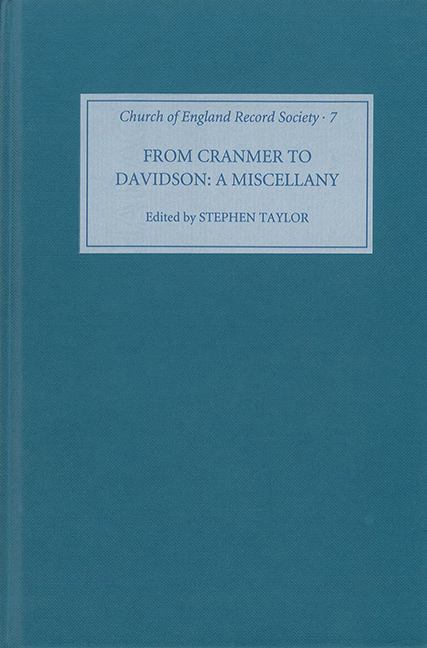Book contents
- Frontmatter
- Dedication
- Contents
- Preface
- Abbreviations
- 1 Thomas Cranmer and the Metropolitical Visitation of Canterbury Province 1533-1535
- 2 Edward Brocklesby: ‘The First Put Out of his Living for the Surplice’
- 3 Richard Montagu: ‘Concerning Recusancie of Communion with the Church of England’
- 4 Petitions for Episcopacy and the Book of Common Prayer on the Eve of the Civil war 1641-1642
- 5 Bishop Edmund Gibson's Proposals for Church Reform
- 6 Samuel Horsley: ‘Thoughts on Civil Government’
- 7 W. J. Conybeare: ‘Church Parties’
- 8 Randall Davidson: A Partial Retrospective
- Index
- Church of England Record Society: COUNCIL AND OFFICERS FOR THE YEAR 1998-99
6 - Samuel Horsley: ‘Thoughts on Civil Government’
Published online by Cambridge University Press: 14 August 2020
- Frontmatter
- Dedication
- Contents
- Preface
- Abbreviations
- 1 Thomas Cranmer and the Metropolitical Visitation of Canterbury Province 1533-1535
- 2 Edward Brocklesby: ‘The First Put Out of his Living for the Surplice’
- 3 Richard Montagu: ‘Concerning Recusancie of Communion with the Church of England’
- 4 Petitions for Episcopacy and the Book of Common Prayer on the Eve of the Civil war 1641-1642
- 5 Bishop Edmund Gibson's Proposals for Church Reform
- 6 Samuel Horsley: ‘Thoughts on Civil Government’
- 7 W. J. Conybeare: ‘Church Parties’
- 8 Randall Davidson: A Partial Retrospective
- Index
- Church of England Record Society: COUNCIL AND OFFICERS FOR THE YEAR 1998-99
Summary
Introduction
Samuel Horsley (1733-1806) was successively bishop of St David's, Rochester (and also dean of Westminster) and St Asaph at the turn of the nineteenth century. He was appointed to the bench of bishops because of his enthusiastic support for William Pitt. In 1793 it fell to Horsley to give the annual sermon for the fast day in remembrance of the execution of Charles I. The event, sometimes something of a formality, was in this year given heightened significance by the execution, nine days earlier, of the former French king Louis XVI. Horsley's sermon on the occasion touched a nerve with his audience from the very start and especially in its peroration, when Horsley reckoned the events in Paris to have been foreshadowed by those of 1649 : ‘O My Country! Read the horror of thy own deed in this recent heightened imitation! Lament and weep, that this black French treason should have found its example in the crime of thy unnatural sons!'
Horsley was an active parliamentarian. To his credit is his involvement in the campaign to achieve an abolition of the slave trade, quite surprising given his antipathy to William Wilberforce - though the two of them were to be caricatured together seeking the solace of the company of buxom negresses after a rejection of one reforming measure in the 1790s. Rather less surprising is his unremitting hostility to the president of the Royal Society, Sir Joseph Banks. Horsley was sometimes over-heated in the expression of his opinions, as John Randolph, bishop of Oxford, noted regretfully when the two had tried to counter anglican Evangelicals' attacks on the supposedly de-christianizing effect of the classical curriculum of schools such as Westminster, of which Horsley felt himself to be the protector . 'I could not repress him, and he would enter into the subject at large with all his violence. He was very entertaining, but did us great harm.’ His intervention in the house of lords on matters of political theory could be similarly flamboyant. When, in 1795, Horsley was taunted by the duke of Bedford that the duke had once overheard him at an election meeting avowing that ‘The people have nothing to do with the laws but to obey them,’ he cried loudly, ‘Hear, Hear,’ even if he was at pains to qualify his outlook when he later spoke in the debate.
- Type
- Chapter
- Information
- From Cranmer to DavidsonA Church of England Miscellany, pp. 203 - 212Publisher: Boydell & BrewerPrint publication year: 1999



